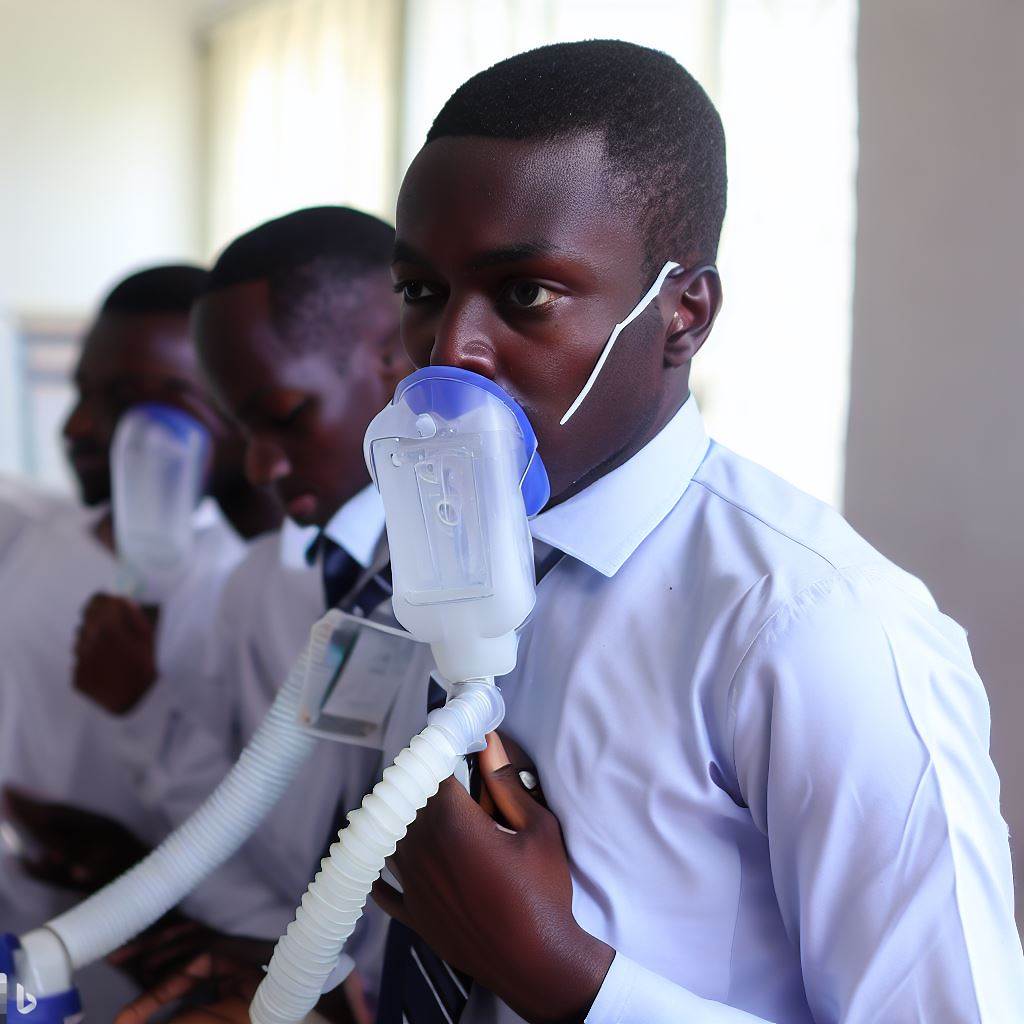Introduction
Speech-Language Pathology (SLP) is a field that focuses on communication and swallowing disorders. Stigmas associated with SLP in Nigeria include misconceptions and social prejudices.
Understanding Speech-Language Pathology (SLP)
Speech-Language Pathology (SLP) is a vital field focusing on communication disorders and swallowing difficulties.
- SLP professionals help individuals improve speech, language, and communication skills.
- They address issues like stuttering, voice disorders, articulation problems, and language development delays.
Stigmas Surrounding SLP in Nigeria
Unfortunately, SLP in Nigeria faces various misconceptions and stigmas that hinder its recognition and effectiveness.
- Misunderstanding: Many assume SLP is only for accent modification or treating foreign languages.
- Cultural Beliefs: Superstitions lead to attributing speech difficulties to curses or supernatural causes.
- Lack of Awareness: Limited knowledge about SLP’s role fuels misconceptions.
- Social Isolation: People with communication disorders might face isolation due to these stigmas.
Challenging and Addressing Stigmas
This blog post aims to debunk these stigmas and create a positive perception of SLP in Nigeria.
- Raising Awareness: Educating the public about SLP’s scope and importance.
- Cultural Sensitivity: Bridging cultural beliefs with modern scientific explanations.
- Collaboration: SLP professionals collaborating with local communities and traditional healers.
- Empowerment: Encouraging individuals to seek help without fear of judgment.
- Advocacy: Pushing for policy changes to integrate SLP services in healthcare and education.
In essence, addressing stigmas in Speech-Language Pathology is crucial for providing effective support to those in need.
As we challenge these stigmas, we pave the way for a more inclusive and understanding society.
The importance of addressing stigmas in Speech-Language Pathology
Effects of stigmas on individuals with communication disorders
Stigmas can lead to isolation and feelings of shame among individuals with communication disorders. They may face difficulties in social relationships and struggle with low self-esteem.
Stigmas can hinder their ability to communicate effectively, impacting their academic and professional success.
Individuals with communication disorders may feel excluded and marginalized by society. Addressing stigmas is crucial for improving the overall well-being and quality of life of these individuals.
Barriers to seeking appropriate SLP services
Stigmas surrounding communication disorders often discourage individuals from seeking professional help.
They may fear being judged or labeled, leading to delayed intervention and treatment. Lack of awareness about available services and their benefits can also be a barrier.
Financial constraints and limited access to qualified professionals contribute to the reluctance in seeking help.
Need for increased awareness and understanding
Addressing stigmas requires increasing public awareness about the nature and causes of communication disorders.
Education campaigns can help debunk myths and misconceptions surrounding speech-language pathology.
Creating a supportive environment where individuals feel understood and accepted is crucial. Promoting empathy and inclusivity fosters a more inclusive society.
Greater emphasis on early intervention and the benefits of SLP services can reduce the impact of stigmas.
By addressing stigmas in Speech-Language Pathology, we can empower individuals with communication disorders.
They deserve equal opportunities and access to the necessary interventions for better communication skills.
Breaking down stigmas will require collaboration among professionals, families, educators, and society as a whole.
Through awareness, understanding, and support, we can create a more inclusive and accepting society for everyone.
Read: Advancements in Speech-Language Pathology: The Nigerian Scene
Common stigmas surrounding Speech-Language Pathology in Nigeria
First Stigma: Associating communication disorders with mental illness
- Explanation of the misconception: Communication disorders, such as stuttering or aphasia, are often misunderstood as signs of mental instability.
Many people mistakenly believe that individuals with communication disorders have mental health issues. - Impact on individuals with communication disorders: This stigma further stigmatizes individuals with communication disorders, making them feel ostracized and misunderstood.
It can lead to lowered self-esteem and hinder their ability to seek appropriate speech-language pathology (SLP) services.
Stigma 2: Belief that language difficulties are a result of witchcraft or spiritual possession
- Examples of such beliefs: In some Nigerian communities, people attribute language difficulties to supernatural causes like witchcraft or spiritual possession.
This misguided belief perpetuates the stigma surrounding communication disorders and discourages individuals from seeking help. - Negative consequences for individuals seeking SLP services: The fear of being associated with witchcraft or spiritual possession prevents individuals from accessing necessary SLP services.
They may prefer to hide their language difficulties rather than face social exclusion or persecution.
Stigma 3: Perception that speech therapy is only for children
- Addressing the misconception and highlighting the need for services among adults: Although speech therapy is commonly associated with children, adults can also benefit from SLP services.
Highlighting the importance of addressing communication disorders in adults helps break this stigma and encourages seeking help. - Discussing the fear and shame surrounding adult SLP services: Many adults feel embarrassed or ashamed of their communication difficulties, which prevents them from seeking SLP services.
Opening up discussions about this fear and the need for support can encourage individuals to take steps towards improving their communication.
In the end, stigmas surrounding Speech-Language Pathology in Nigeria contribute to the further marginalization of individuals with communication disorders.
Addressing these stigmas is crucial to create a more inclusive society that recognizes the importance of SLP services for people of all ages.
By debunking misconceptions, raising awareness, and providing support, we can work towards empowering individuals with communication disorders to live fulfilling lives and achieve their communication goals.
Read: Demystifying Myths Around the Respiratory Therapy Profession in Nigeria

Strategies for challenging stigmas in Speech-Language Pathology in Nigeria
Education and Awareness Campaigns
Addressing stigmas in Speech-Language Pathology in Nigeria requires active measures. Education and awareness campaigns play a crucial role in dispelling misconceptions.
By collaborating with schools, NGOs, and community leaders, we can reach a wider audience and foster understanding.
To further enhance our efforts, distributing informative materials and organizing workshops will empower people with knowledge about speech-language disorders and the importance of early intervention.
Reshaping Public Perception Through Media
Reshaping public perception is equally vital, and the media can be a powerful ally.
Leveraging social media platforms to share success stories of individuals who benefited from SLP services will inspire others to seek help without shame.
Engaging with Healthcare Providers and Policymakers
Working with local media outlets ensures accurate and positive portrayals, challenging stereotypes head-on.
Engaging healthcare providers and policymakers is crucial. Advocacy for the inclusion of SLP services within national healthcare policies can lead to better support and funding.
Collaborating with existing healthcare infrastructure expands the reach of SLP services, making them more accessible across Nigeria.
In fact, combating stigmas in Speech-Language Pathology is a collective effort.
Through education, media advocacy, and collaboration with healthcare providers and policymakers, we can foster a society that embraces and supports individuals with speech-language disorders.
Read: The Salary Structure of Speech-Language Pathologists in Nigeria
Success stories and examples of overcoming stigmas in Nigerian SLP
Throughout Nigeria, there are remarkable success stories that challenge the stigmas surrounding speech-language pathology (SLP) and communication disorders.
These stories show the transformative power of SLP interventions and highlight the importance of education and awareness in overcoming societal stigmas.
Personal anecdotes from individuals with communication disorders
A young woman shares her journey of overcoming the stigma surrounding her speech disorder. A man recounts how therapy helped him gain confidence and overcome the shame he felt.
A child’s parent talks about the transformation they have witnessed since their child started SLP sessions.
Personal anecdotes provide powerful insights into the experiences of individuals with communication disorders.
A young woman shares her journey of embracing her speech disorder identity as a source of strength and resilience.
She emphasizes the impact of therapy in developing her communication skills and boosting her confidence.
Similarly, a man recounts how SLP sessions helped him overcome the shame associated with his speech difficulties and build a better social life.
Highlighting successful SLP programs and initiatives in Nigeria
The J & J Calvary Hearing and Speech Centre in Lagos is recognized for its holistic approach and positive outcomes. Highlighting successful SLP programs and initiatives is crucial in addressing stigmas.
The J & J Calvary Hearing and Speech Centre in Lagos is renowned for its comprehensive approach, offering therapy, counseling, and support groups.
The Joy In Africa Foundation’s outreach program provides free speech therapy services in rural communities.
Another initiative, the Joy In Africa Foundation, focuses on reaching underserved communities, providing free speech therapy services and conducting awareness campaigns.
The University of Medical Sciences, Ondo collaborates with local hospitals to train SLPs and raise awareness.
It has achieved remarkable results in empowering individuals with communication disorders to live fulfilling lives.
Read: The Path to Becoming a Surgeon in Nigeria
Case studies demonstrating the positive impact of SLP interventions.
- Case study 1: A teenager with a severe stutter gains fluency through intensive speech therapy.
- Case study 2: A child with a cleft palate shows significant improvement in speech intelligibility after intervention.
- Case study 3: A stroke survivor regains his ability to communicate effectively through SLP support.
Case studies further demonstrate the positive impact of SLP interventions. In one case, a teenager with a severe stutter underwent intensive speech therapy, resulting in remarkable fluency improvement.
This success not only transformed the individual’s life but also challenged societal misconceptions about stuttering.
Similarly, a child born with a cleft palate showed significant progress in speech intelligibility through ongoing SLP support, fostering their integration into mainstream education.
Lastly, a case study featuring a stroke survivor illustrates the profound impact of SLP interventions on restoring communication abilities.
Through a combination of speech and language therapy, this individual regained effective communication skills and regained independence, improving their overall quality of life.
These success stories, along with personal anecdotes, SLP programs, and case studies, provide a comprehensive picture of the positive outcomes of addressing stigmas in Nigerian SLP.
By showcasing these success stories, it becomes evident that overcoming stigmas is possible and that everyone deserves access to high-quality SLP services.
Increased awareness and education can further contribute to breaking down barriers and empowering individuals with communication disorders throughout Nigeria.
Read: Interview Tips for Aspiring Respiratory Therapists in Nigeria
Conclusion
Addressing stigmas in Speech-Language Pathology is crucial in Nigeria to ensure equal access and quality care for individuals with communication disorders.
It is essential for professionals, educators, policymakers, and the public to work together consistently to challenge and overcome stigmas associated with communication disorders.
Every individual can make a difference by spreading awareness, advocating for inclusive services, and supporting individuals with communication disorders in Nigeria.




